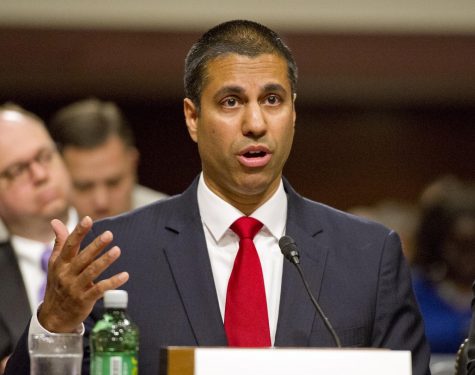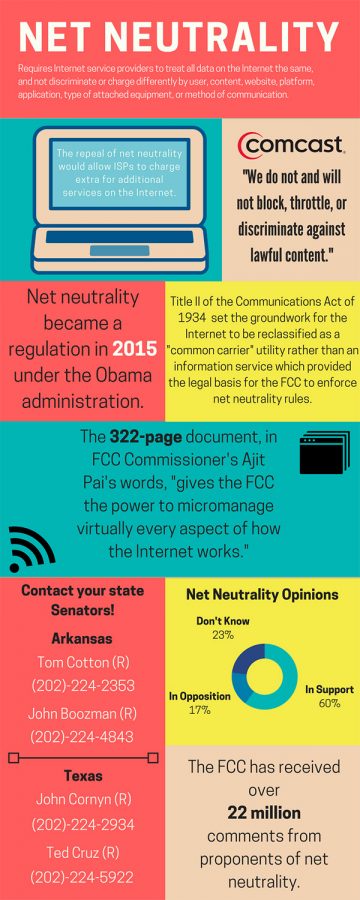The truth about Net Neutrality
Controversial policy is commonly misunderstood
December 13, 2017
The internet is undoubtedly one of the most revolutionizing technologies in all of human history. It has remained unregulated from 1990 to 2015 and grew exponentially as a result. Today, the internet is a primary resource for sharing information, and every time someone opens it, they have unlimited potential to nearly 1,200 petabytes of information. Then came along Net Neutrality.

There has been hordes of backlash from the public over the FCC’s proposal to repeal Net Neutrality. Many major technology companies have advocated for a free and open internet. If so much controversy clouds this issue, and most people agree with the concept of Net Neutrality, what does the opposition believe, and what is Net Neutrality?
Net Neutrality was originally a policy that was controlled by the market but soon became an official piece of legislation under the Obama Administration in 2015. It requires Internet Service Providers to treat all data on the Internet the same, and not discriminate or charge differently by user, content, website, platform, application, type of attached equipment, or method of communication.
This may sound to be beneficial to the average person seeking true information or the general consumer, but it is not as black and white. Even with this regulation, major technology companies are working their way through the loopholes. Some proponents of the regulation say that eliminating it would kill the internet and allow for ISP’s to engage in mass censorship and carve the internet into fast and slow lanes. However, major technology companies already censor information and even though the internet is not carved into fast and slow lanes, these companies will always find a way to make more money off of the consumer. To many proponents’ surprise, the elimination of Net Neutrality would help to actually alleviate these problems.
For instance, there is hard evidence that major companies such as Facebook censored certain political advertisements and allowed other political advertisements and misinformation to spread during the 2016 Presidential Election. Despite the fact that there were no government regulations concerning this issue at the time, the point is clear: large technology companies will almost always have control of the information of what is put on the internet.
However, there is a specific reason why many of these technology companies are supporting Net Neutrality: with Net Neutrality in place, consumers are not actively worried about the fears commonly associated with the lack of Net Neutrality, and technology companies can continue their misbehaving practices. Contrary to the general public’s knowledge, government regulations are not in place to restrict technology companies; government regulations are in place to protect these large companies from smaller competition. They are actually commonly written by the companies themselves with their representatives inside the government. This is simple lobbying and is not capitalism at all, and there is no guarantee that Net Neutrality does anything to prevent this.

Net Neutrality actually benefits them because if it was repealed, smaller companies would pose a threat to their larger counterparts. Sure, masses of consumers distrust these large telecoms. However, there are more minor parts of these types of regulations that continue to allow these telecoms to survive. If the market was truly free, these large telecoms would eventually cease to exist, and they would be replaced by smaller options that are less expensive and offer a better service.
Now, consider the fast and slow lanes of the internet. Opponents of Net Neutrality believe this argument is truly unrealistic, and net neutrality offers an even more unrealistic solution. Consider the U.S. Postal Service. If Net Neutrality was applied to it the same way it is to the internet, all mail regardless of weight or size would have to ship as slow as a bowling ball in a package. This places a strain on the entire system, and is an equivalent of communism where everyone makes the same wage. Following this rule is difficult too, especially for smaller companies attempting to compete against the large telecoms. If Net Neutrality was repealed however, smaller companies would compete with larger ones and offer better service for a cheaper price.
The idea that one side of the political spectrum is blaming the other for being responsible for killing the internet is completely absurd. No one wants the internet to be handled by large, greedy monopolies, and no one wants it to go away or to be censored. However, the irony is that proponents of Net Neutrality wish to give total control of the Internet to the U.S. government- the largest monopoly in the world.
Opponents claim that government is ineffective at managing anything and everything. Then why would we give control of the internet to the government? Forbes describes it as this: “We’re talking about the same organization that spent an amount equal to Facebook’s first six years of operating costs to build a health care website that doesn’t work, the same organization that can’t keep the country’s bridges from falling down, and the same organization that spends 320 times what private industry spends to send a rocket into space.” Proponents of Net Neutrality do not know that their worst fears about the outcome of the internet and possible censorship are shared by Net Neutrality’s opposition, and they are much more likely to become true under government regulations. No matter what side of the aisle you are on, any government that desires to suppress free speech and criticisms of the government can and will do so if they have the power to, and no one wants that.
Some see the government to be a benevolent organization that protects the weak while in reality it is heavily influenced by lobbyists who use it to their advantage. However, most Americans would trust the free market much more than a tyrannical government allowing the National Security Administration to scrutinize and spy on consumers.The 332-page Net Neutrality legislation, in the FCC Commissioner Ajit Pai’s words, “gives the FCC the power to micromanage virtually every aspect of how the Internet works,” which would be disastrous for all consumers. According to the opposition, the only problem with proponents of Net Neutrality is that they are afraid of the wrong thing.

